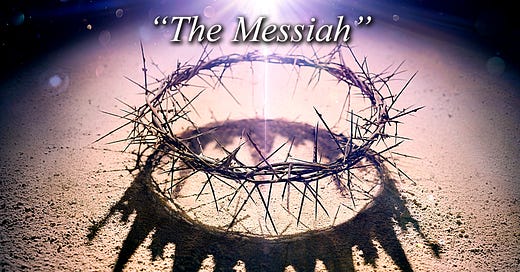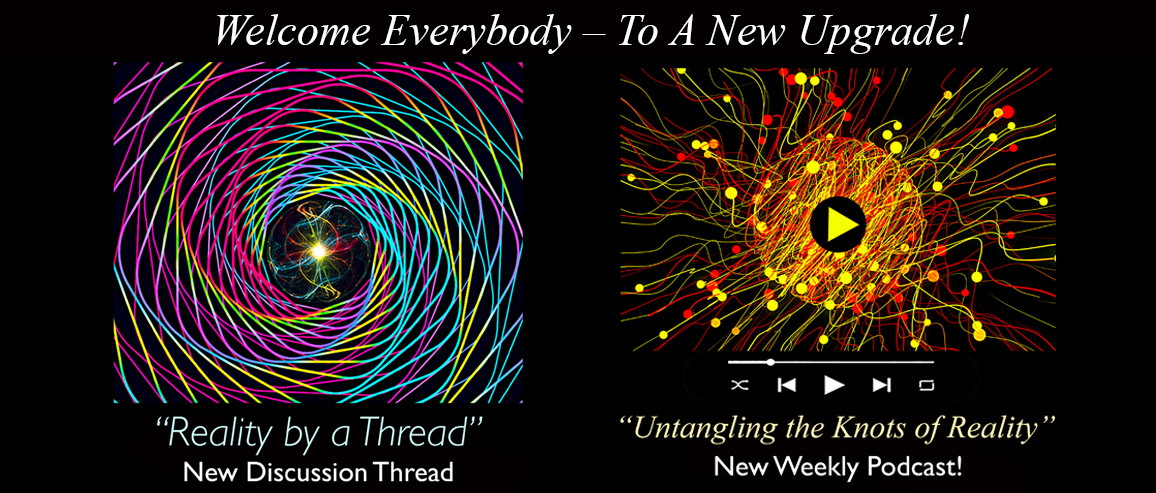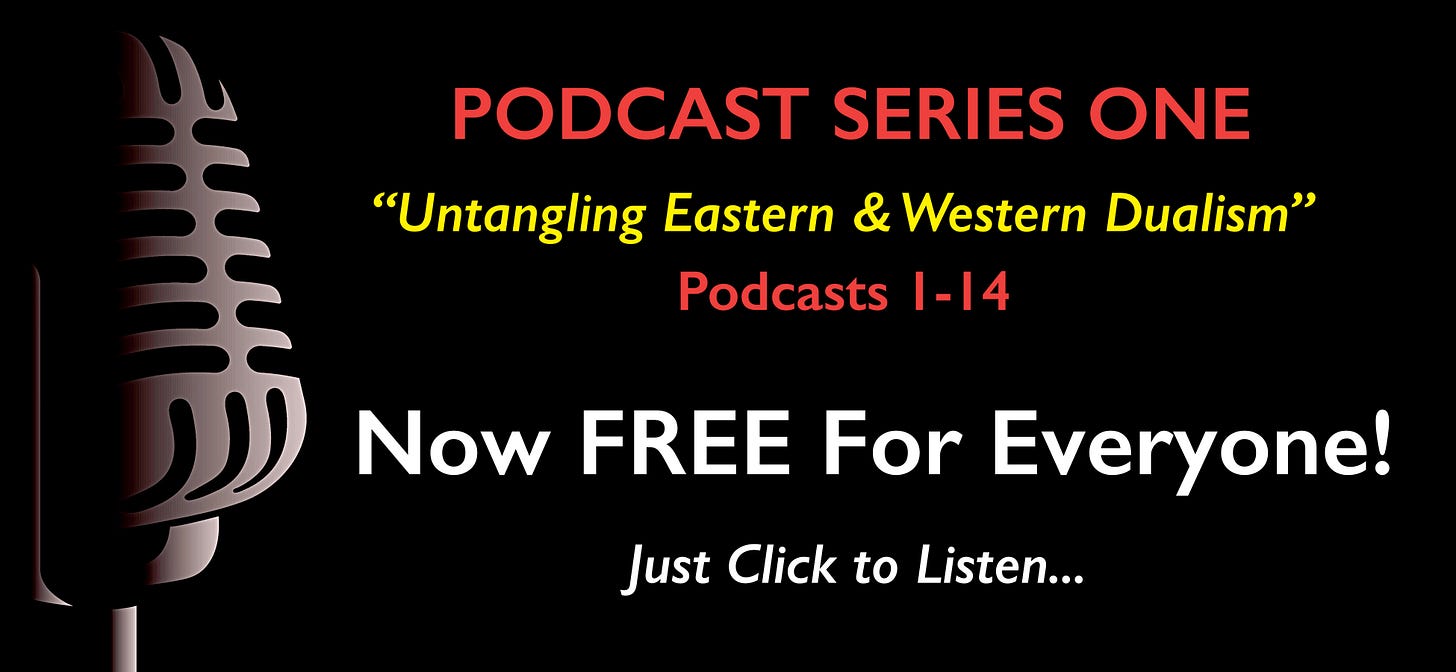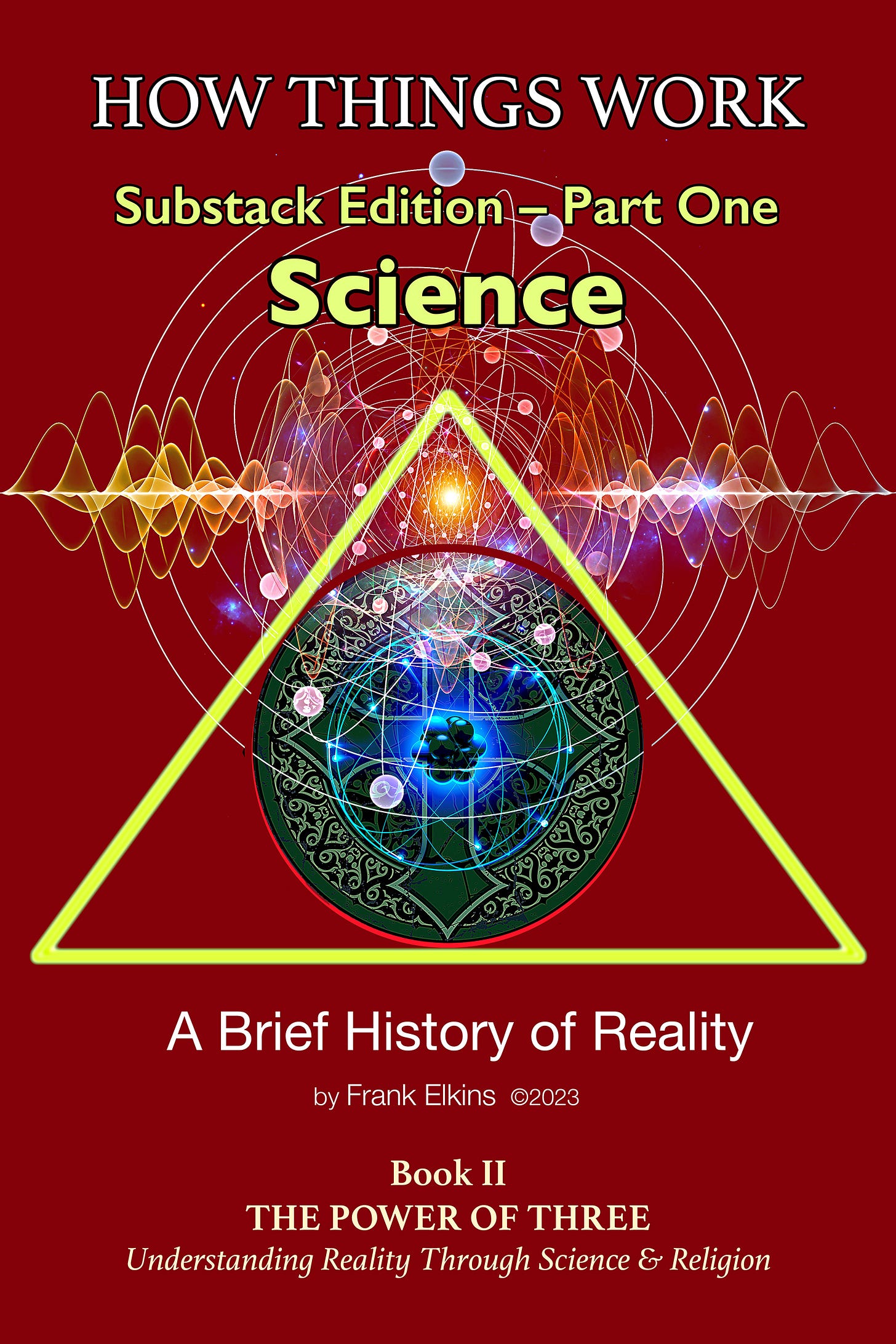How Things Work: A Brief History of Reality
BOOK II: The Power of Three (Science & Religion) – Consideration #97. "The Messiah"
Be a part of the Conversation!
Tuesday August 22, 2023
“But what about you?” he asked. “Who do you say I am?” Simon Peter answered, “You are the Messiah, the Son of the living God.”
– Matthew 16:15-16
PREFACE
Welcome Everybody!
The term “messiah” means “anointed one” in Hebrew; translated as “chrīstós” in Greek. The essential mission of the messiah was to bring about the restoration of Israel. From a Jewish perspective, the Messiah was expected to rebuild the temple in Jerusalem, usher in a new messianic age of peace and spiritual enlightenment and bring the “true awareness” of God to all people.
“The messiah would once again deliver Israel from bondage, reestablish Jerusalem, and restore Israel to the glories of its previous golden age.”
The Torah describes the messiah as a human being that is born of parents who were direct descendents of the Jewish King David, and who would be the “perfect teacher” of God’s Law. The messiah would once again deliver Israel from bondage, re-establish the Temple in Jerusalem, and restore Israel to the glories of its previous golden age. The “true” messiah would be the liberator, savior, and redeemer of not only Israel; but of all “mankind.”
“The promised messiah, like the promised land, becomes a pillar of faith connecting the Jewish people to a predetermined future…”
To a great extent the messiah serves as a symbol and metaphor of hope for the Jewish people after the destruction of the Temple and their nation. The promised messiah, like the promised land, becomes a pillar of faith connecting the Jewish people to a predetermined future based on an ancient covenant God had made with Abraham and Moses. Essentially, the Messiah reflected the “certain faith” of God’s return to “mankind” on earth.
According to Bible Studies Tools.com:
“The Messiah is the instrument by whom God's kingdom is to be established in Israel and in the world. The hope of a personal deliverer is thus inseparable from the wider hope that runs through the Old Testament. The Jews were a nation who lived in the future. In this respect they stand alone among the peoples of antiquity. No nation ever cherished such strong expectations of a good time coming, or clung more tenaciously amid defeat and disaster to the certainty of final triumph over all enemies and of entrance upon a state of perfect peace and happiness. The basis of this larger hope is Yahweh's covenant with Israel. ‘I will take you to me for a people, and I will be to you a God’ (Exodus 6:7). On the ground of this promise the prophets, while declaring God's wrath against His people on account of their sin, looked beyond the Divine chastisements to the final era of perfect salvation and blessedness, which would be ushered in when the nation had returned to Yahweh.”
Bible Studies Tools.com
God, in fact, had not deserted human beings; one day He would return as The Messiah.
CONSIDERATION #97 – The Messiah
According to some Biblical scholars there are over 300 references to the Messiah in the Old Testament and over 500 references in the New Testament. There are generally 50-60 prophecies commonly used and referenced by both the Old Testament and the New Testament. However, much like the prophecies of Nostradamus, Biblical prophecies related to the Messiah are often cryptic and ambiguous. In addition, there are prophecies related to the “kingly” Messiah as well as a “spiritual” Messiah.
The suggestion of a Messiah first occurs in the Garden of Eden. God sets up a scenario in which He will provide a descendent through Eve who will one day destroy the work of the serpent and provide retribution for all “Mankind.” However, “he,” the Messiah, will be “wounded” in the process.
“And I will put enmity
between you and the woman,
and between your offspring and hers;
he will crush your head,
and you will strike his heel”(Genesis 3:15).
Later in Genesis, the covenant with Abraham is expanded through Jacob when asurring future blessings to his decedents with the promise of a future ruler, or king, from their bloodline, who is destined to rule all nations.
“The scepter will not depart from Judah,
nor the ruler’s staff from between his feet,
until He comes to whom it belongs
and the obedience of the nations is His”
(Genesis 49:10).
Most of the other references to the Messiah in the Bible are about “defining” who this prophecy is referring to. One possibility is a dynamic ruler or king who will restore the glory of the Jewish people.
“I see him, but not now; I behold him, but not near. A star will come out of Jacob; a scepter will rise out of Israel . . . a ruler will come out of Jacob . . .”
– Numbers 24:17,19
“You are my Son, today I have become your Father. Ask of me, and I will make the nations your inheritance; the ends of the earth your possession. You will rule them with an iron scepter, you will dash them to pieces like pottery.”
– Psalm 2:7-9
“Here is my servant, whom I uphold, my chosen one in whom I delight; I will put my Spirit on him and he will bring justice to the nations . . . He will not falter or be discouraged till he establishes justice on earth…”
– Isaiah 42:1,4
“When your days are over and you rest with your ancestors, I will raise up your offspring to succeed you, your own flesh and blood, and I will establish his kingdom. He is the one who will build a house for my Name, and I will establish the throne of his kingdom forever”
– 2 Samuel 7:12–13
However, the prophet Isaiah proclaims a different aspect of the Messiah. Isaiah’s Messiah would suffer wounds and die for the inequities of the people. This “suffering Messiah” would embody a “savior” or “redeemer” more than a warrior, or a king. Most Jews were anticipating and hoping for a dynamic ruler or potentate to free them from their “physical” bondage; however, a sect of Jews, who would become known as “Christians,” recognized Jesus of Nazareth as the “suffering Messiah” prophesied by Isaiah. A Messiah who would save us from our “spiritual” bondage.
“But he was wounded because of our transgressions, he was crushed because of our iniquities: the chastisement of our welfare was upon him, and with his stripes we were healed. All we like sheep did go astray. We turned every one to his own way; and the Lord hath made to light on him the iniquity of us all. He was oppressed, though he humbled himself and opened not his mouth; as a lamb that is led to the slaughter, and as a sheep that before her shearers is dumb; yea, he opened not his mouth. By oppression and judgment he was taken away, and with his generation who did reason? For he was cut off out of the land of the living, for the transgression of my people to whom the stroke was due. And they made his grave with the wicked, and with the rich his tomb; although he had done no violence, neither was any deceit in his mouth.
…Of the travail of his soul he shall see to the full, even My servant, who by his knowledge did justify the Righteous One to the many, and their iniquities he did bear. Therefore will I divide him a portion among the great, and he shall divide the spoil with the mighty; because he bared his soul unto death, and was numbered with the transgressors; yet he bore the sin of many, and made intercession for the transgressors.”
– Isaiah 52:13-53:12
To a great extent, the history of Israel was a history of war and conquest. Jewish tradition was based on strong warrior prophets such as Abraham, Moses, and King David. The very proof of God’s power was demonstrated through the powerful actions they performed; particularly in terms of defeating stronger enemies and armies. Jesus of Nazareth did not match this expectation.
However, from the perspective of a small group of Jews who were the followers of Jesus, he was the perfect match for the “suffering Messiah” prophesied by Isaiah. Not a warrior or king, but a savior, or redeemer. The very “word” of God manifested into flesh and blood. Flesh and blood that would be voluntarily sacrificed for the atonement of all mankind. The Messiah.
A New Testament of God’s Love for humanity.
POSTSCRIPT
Although both Judaism and Islam now recognize Jesus of Nazareth as a legitimate prophet; neither recognize him as the “final prophet,” or “Messiah.” However, Christians do. The Jewish people are still awaiting the arrival of the Messiah. However, Christians have declared Jesus of Nazareth as the “New Testament” of God’s relationship, and covenant, with humanity. For Christians, Jesus is the physical incarnation of God’s Law: Jesus physically manifests the Law of Moses.
“The Gospels reflect an attempt to directly connect Jesus to the Messianic prophecies of the Old Testament…”
The New Testament tells the story of Jesus of Nazareth in four Gospels as reported by his followers and disciples. It also tells the story of his apostles and disciples after his crucifixion. The Gospels reflect an attempt to directly connect Jesus to the Messianic prophecies of the Old Testament as proof related to his authority. The New Testament sets up a narrative in which Jesus of Nazareth is either a blasphemer who breaks and diminishes the Law of Moses, or the Messiah, who fulfills and transcends them.
Next week we begin our consideration of the New Testament and its overpowering influence on our reality as human beings…
This Week on “The Thread”…
Expand the Conversation by Upgrading to “Reality by a Thread!”
•Untangling the Knots of Reality: Podcast #57 “Untangling Digital Reality” – “How does digital technology turn physical sensations into mathematical abstractions? How does digital technology translate empirical reality into digital code? Will digital human beings eventually replace analog human beings? Is Reality simply a cosmic computer program designed to discover and recreate itself? These are a few of the knots we will attempt to untangle in this week’s podcast. That’s a lot of Digital Reality for one podcast!
So, let’s get started…”
• REALITY BY A THREAD: BOOK VI PREVIEW (The Rational Being ) Short Story: “Perfection” – Part 1 “Since the birth of mankind, human beings have always sought perfection: A more perfect Union, a more perfect person, a more perfect machine... a more perfect world. In the end, it turns out that humans and perfection are not all that compatible...”
•FREE PDF Download of Book IV: “The Cosmic Symphony – Overtones of String Theory” plus other Free Books, Discounts and Benefits. Also Gain Complete Access to all Previous Podcasts and Threads!
UPGRADE NOW!
Available Now!
Excerpt from PODCAST #11: "Untangling Aristotle’s Metaphysics"
If you find yourself growing tired of the same old meaningless fluff, this may be the Podcast you’ve been looking for!
Podcast #1 – A Lot of Explaining
Podcast #2 – Untangling Mathematics & Metaphors
Podcast #3 – Untangling the Garden of Eden
Podcast #4 – Untangling The Physical World
Podcast #5 – Untangling the Rational Mind
Podcast #6 – Untangling Eastern & Western Dualism
Podcast #7 – Untangling Zen & the Shaolin Temple
Podcast #8 – Untangling the Mystery of Taoism
Podcast #9 – Untangling The Noble Eightfold Path
Podcast #10 – Untangling Plato's Realm of Forms
Podcast #11 – Untangling Aristotle's Metaphysics
Podcast #12 – Untangling Happiness & Virtues
Podcast #13 – Untangling Self-Evident Truths
Podcast #14 – Untangling The Cosmic Symphony
“Untangling the Knots of Reality – Be A Part of the Conversation!”
Coming This September! The Second “Substack Edition” in the How Things Work Series…
“Reality is built on Abstraction…”
Book II The Power of Three – Substack Edition (Part One) SCIENCE
Einstein said time is an illusion. Ever wonder why? If you have always wanted a Deeper Knowledge of Science, wished you could Understand Einstein, or are curious to know what Quantum Mechanics is all about without needing a degree in Math or Science – this book is for you!







